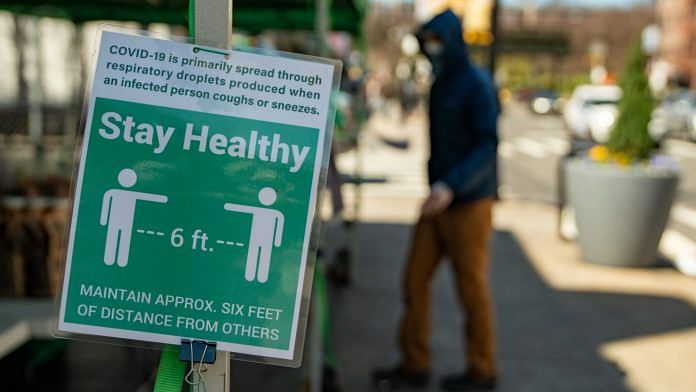New Delhi: A new survey has found that one out of five residents in New York City had antibodies against the novel coronavirus, suggesting that Covid-19 may have been more widespread than previously thought.
New York Governor Andrew M. Cuomo Thursday described the initial results from the survey of 3,000 people across New York State who were randomly tested for antibodies — a protein produced by the body to fight off pathogens.
According to Cuomo, if this trend holds true for the rest of the population, as many as 2.7 million in New York State may have already encountered the virus without knowing.
Holding a briefing with updates on #Coronavirus. Watch Live: https://t.co/vWhF4W6edg
— Andrew Cuomo (@NYGovCuomo) April 23, 2020
Also read: US FDA says smokers could have higher risk of catching coronavirus
Results from the survey
The survey found that 13.9 per cent of those tested in New York State had antibodies against Covid-19. These tests were conducted in 40 locations across the state.
In New York City alone, out of 1,300 people, 21 per cent tested positive for antibodies.
The survey targeted people who were outside their homes, but not working — such as those visiting grocery stores.
Breaking down the data demographically showed that 12 per cent women and 15.9 per cent men across New York State tested positive for the virus.
On the other hand, 22.1 per cent of the African-American population and 22.5 per cent of the Latino/Hispanic population tested positive for the antibody in the state. Cuomo, however, said a majority of people belonging to these races resided in New York City, where the rate of infection is already very high.
The survey also showed that 13 per cent of those over 75 years and 26.8 per cent above the age of 55 tested positive for antibodies across New York State.
Virus spread wider than believed
The fact that 3,000 surveyed people have survived the virus also meant the fatality rate of Covid-19 infection is far lower than believed, said Cuomo.
He also said that antibody testing helps identify people who can donate blood for convalescent plasma therapy.
These tests help identify infection rates in different populations, and understand whether the rates are increasing or decreasing, which in turn can inform the “reopening strategy”, he added.
“Then when you start reopening, you can watch that infection rate to see if it’s going up and if it’s going up, slow down,” said Cuomo.
Also read: Why there is a big debate over accuracy and results of Covid anti-body tests
Tests generate missing data
Cuomo said that all data on infectiousness and death rate of a disease comes from hospitals. But to establish a baseline of any infection rate in a region, its spread beyond hospitals should also be established.
He added that New York health officials will continue to carry out these antibody tests on “a rolling basis” to get a regular snapshot of what is happening with the Covid-19 infection rates in the state.
Survey indicates low herd immunity in New York City
Responding to the survey results, T. Jacob John, former head of the Indian Council for Medical Research’s Centre for Advanced Research in Virology, told ThePrint that this figure also represents New York’s herd immunity.
Herd immunity is described as a situation when a large percentage of a population has become immune to an infection. This, in turn, provides a measure of indirect protection for individuals who are not immune.
“Twenty one per cent is far too low a herd immunity for turning the curve down,” John said. When more and more people test positive for these antibody tests, the disease cannot spread as fast since a high percentage of the population is already immune.
During the press briefing, Cuomo also pointed out that although the curve indicating new infections was flattening, it was yet to start turning down — which would indicate that new infections are decreasing.
What are antibody tests
Antibody tests are not the same as diagnostic tests. Testing positive for antibodies indicates that a person possibly became exposed to the virus sometime in the past, but may have not developed the disease.
Conducting wide scale antibody tests helps to determine how much of the population has been exposed to the virus and perhaps developed immunity against it.
Anticipating a global spike in demand for these tests, manufacturers have rushed to develop kits. However, the jury is still not out on the reliability of these tests.
Considering the urgency of conducting these tests, the US Food and Drug Administration (FDA) has relaxed some of the rules governing them, though results of these examinations should not be used as the sole basis for confirming that someone has the disease.
According Peter Collignon, a physician and laboratory microbiologist at Australian National University in Canberra, kits need to be trialled on large groups of people to verify the accuracy of antibody tests. Some commercial antibody tests have recorded accuracy as low as 40 per cent, he added.
Also read: Support for Trump is sliding as he muddles his way through virus crisis, surveys show



